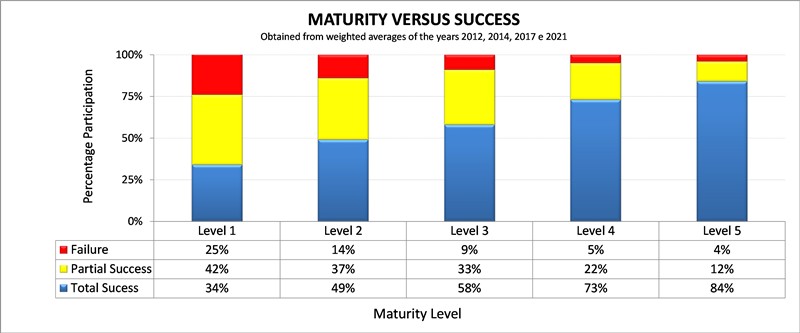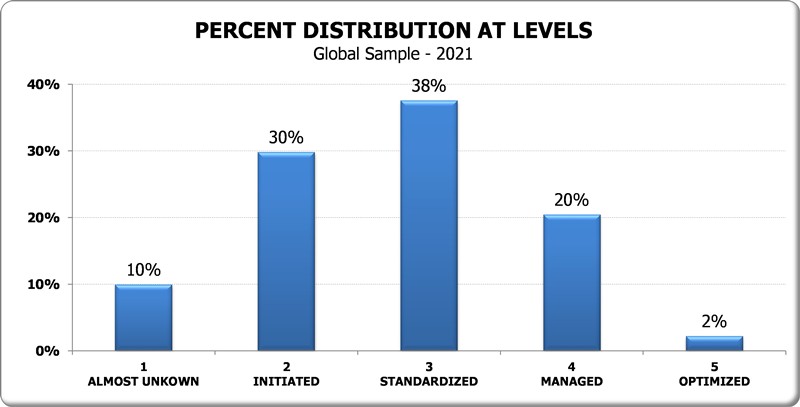Lessons Learned from the PMMM Research Series
SERIES ARTICLE
By Darcy Prado, PhD
Belo Horizonte (MG) – Brazil
ABSTRACT
This is the fourth article in the series “Lessons Learned from Maturity Research”. We now present the journey towards the evolution of maturity in project management, discussing peculiarities and challenges. We remind the reader that knowledge of the articles published in previous issues of this journal [5,6,7] is very important for a proper understanding of this text.
1 – THE IMPORTANCE OF MATURITY DEVELOPMENT
As shown in the graph below (Figure 1), the importance of maturity development is clearly demonstrated by the fact that the greater the maturity level, the greater the success rate of projects execution and outcome.

Figure 1: Relationship between Success and Maturity [1].
The data shown in Figure 1 was obtained from data presented in a previous article [5]. The values shown in this graph represent the weighted averages for the years 2012, 2014, 2017 and 2021.
For many organizations, reaching maturity platform of excellence (levels 4 and 5) means survival and growth in the competitive business market. For them, evolution is not only desired, but necessary. Certainly, reaching this level is an important goal, but unfortunately, this is not easily achievable. Figure 2 demonstrates that in 2021, most Brazilian organizations were at lower levels of maturity. Maturity levels 1, 2 and 3 combined represented 78% of Brazilian organizations, and only 22% were at maturity levels 4 and 5.

Figure 2: Maturity levels participation 2021 [1].
What would then be a strategy to reach the maturity platform of excellence? Before we address this subject, it is important to review the different components of the path of maturity development (this subject was also presented in article 1 of this series [4]).
More…
To read entire article, click here
Editor’s note: The Project Management Maturity series of articles by Prof Darci Prado is based on his extensive research on this topic in Brazil and other countries. Darci is the developer of the Prado Project Management Maturity Model which has been successfully implemented by many organizations in Brazil. More about this model and related research can be found at. https://maturityresearch.com/en/home-en/
How to cite this work: Prado, D. (2025). Maturity Evolution: a Challenging Journey, Lessons Learned from the PMMM Research, Series article 4, PM World Journal, Vol. XIV, Issue VII, July. Available online at https://pmworldlibrary.net/wp-content/uploads/2025/07/pmwj154-July2025-Prado-maturity-evolution-lessons-learned-series-article-4.pdf
About the Author

Darci Prado, PhD
Belo Horizonte (MG) – Brazil
![]()
Darci Prado is a consultant and partner of FALCONI in Brazil. He is an engineer, with graduate studies in Economical Engineering at UCMG and PhD in Project Management from UNICAMP, Brazil. He has worked for IBM for 25 years and worked with UFMG Engineering School for 32 years. He holds the IPMA Level B Certification. He was one of the founders of Minas Gerais State and Parana State PMI chapters, and he was a member of the Board Directors of the Minas Gerais State PMI chapter during 1998-2002 and member of the Consulting Board during 2003-2009. He was also the president of IPMA Minas Gerais State chapter during 2006-2008. He is conducting Project Management maturity research in Brazil and Italy. He is author of nine books on project management and is also author of a methodology, a software application, and a maturity model for project management. Darci can be contacted at darciprado@uol.com.br.
To view other works by Dr. Prado, please visit his author showcase in the PM World Library at https://pmworldlibrary.net/authors/darci-prado-phd/









